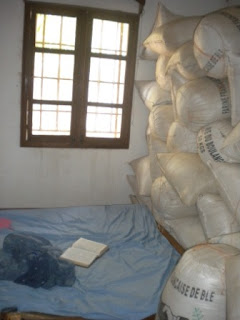A few weeks ago we decided that we didn't want any more chickens, in order to stop the growth of our flock we ate the three cockerels we had. However, we were not aware at the time that one of the hens was sitting on fertilised eggs, it came as a surprise the other day when I saw nine little chicks pottering around the garden.
Last night I was awoken at 1.18am to the cheep cheeping of these little chicks, I lay in bed for a while wondering what could be the cause of their distress. Knowing that there is a hole in the back of the chicken house I thought maybe that dastardly ground pig had returned to claim our new arrivals. Thinking this was my chance to finally get that big rat, I ventured outside to investigate.
I approached the chicken house to see that at least two chicks were writhing around outside, as I got closer I saw that they were covered in ants. Now, these ants are called Driver Ants (http://en.wikipedia.org/wiki/Dorylus) in English and in Mende they are called 'Konga'. They come in different sizes but all have disproportionately large heads with huge jaws that lock shut once they clamp on to something. I have often seen the Konga moving in lines across roads or paths during the dry season, relocating there nests, but I have never seen the destruction they reek. I am told that their attack of our chicken house is nothing, colonies of these ants can lead whole villages to have to temporarily relocate if they are moving through and little but fire deters them.
Having never had a close encounter with Driver Ants I assumed that if I could brush the chicks the ants would just come off and run away, needless to say this was not happening and they had their grip on them. The three chicks outside the chicken house were beyond saving and I knew they were suffering, I saw a big stone and attempted to summon the courage to put them out of their misery. Here it is said that women are not supposed to kill anything because they give birth to children, this thought kept coming into my mind and I was unable to end the chicks suffering, I woke SK (Winston's younger brother) to assist.
SK reluctantly got out of bed and came to assist in the rescue of the chicks. First we had to put the three out of their misery :( Then we opened the chicken house whilst hopping around all over the place to stop the ants biting (which they did anyway and it is very painful!) We removed the remaining six chicks and the two hens that look after them and carried them to the veranda where there was some light.
The Konga had attacked the chicks where they were most vulnerable, around their eyes, under their wings and on their bellies. We meticulously pulled each ant out one by one. This is not easy, as I said before, they lock their jaws and you have to twist their heads to remove them. The ants had also attacked the two hens but only on their feet so we removed those too. We put them all in a rice bag together to keep them warm and together. You could see the relief in the chickens at the end of their attack, but all the chicks were covered in wounds.
Returning to bed I was unable to sleep. I was astounded and the damage that such small creatures could do and images of them over running the house kept coming into my head. This morning we returned to the chicken house to see if the ants had moved on. They had not, luckily though, the other chickens were unaffected by the attack as they had been on the upper levels of the house.
The only way to get rid of the Driver Ants is to use fire so this morning we poured kerosene around the chicken house and set fire to the ground (not the house itself.)
Part of me thinks this is silly, but it was actually a traumatic experience for me, I still have ant paranoia (the feeling of having ants crawling on you when there is nothing.) SK and Hadja thought it very strange this morning when I wanted to clean the chicks' wounds with antiseptic: "but they're just chickens, they will sort themselves out" they said. This is just another demonstration for me of the difference between out cultures, my desire to intervene and their's to let nature take its course. I don't know if the chicks will survive, but I hope that our intervention will help them to.
 |
| Abdul Rahman helping me set fire to the Konga |
 |
| It is a little difficult to see them (my camera is not great) but the ants are the red/back coloured specks |
 |
| A little worse for wear this morning |
 |
| Poor wounded chickens |












































